Leadership Vs Authority
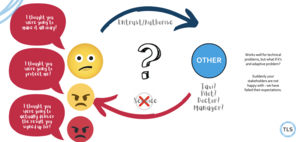
Instructions
SLIDE XX: INTRODUCTION/TITLE SLIDE
We can't understand leadership without understanding authority.
Exercising adaptive leadership is radically different from doing your job really, really well. It is different from authoritative expertise, and different from holding a high position in a political or organisational hierarchy. It is also different from having enormous informal power in the forms of credibility, trust, respect, admiration, and moral authority.
As you have undoubtedly seen, many people occupy positions of senior authority without ever leading their organisations through difficult but needed adaptive change.
SLIDES XX: LEADERSHIP VS AUTHORITY
Look at this further: Me/other
Pilot: Who has flown recently? Check license? credentials? sobriety? Why? Taxi driver: ? What do we expect from a doctor? Our manager?
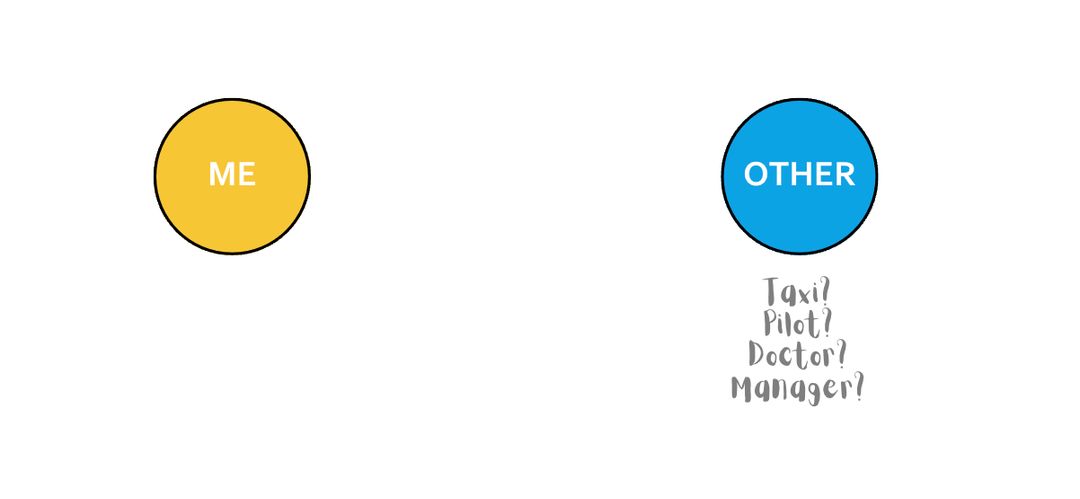
We entrust/authorise them to provide what? A service.
The powers and influence that come from formal and informal authority relationships have the same basic structure. The social contract is identical: Party A entrusts Party B with power in exchange for services.
Sometimes this contract is formalised in a job description or an authorisation establishing a task force, organisational unit, government agency, or organisational mission.
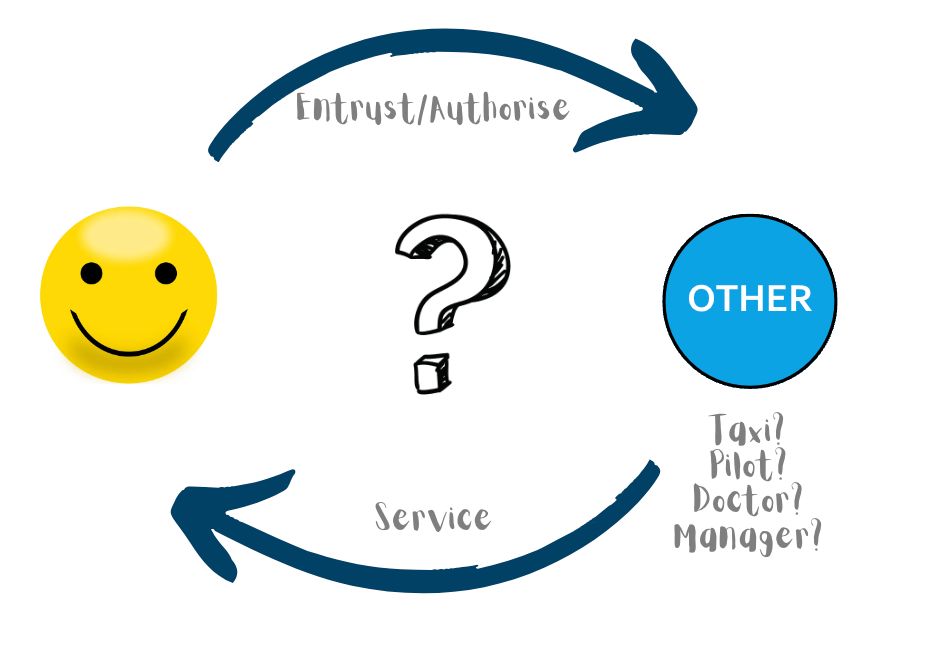
Sometimes the contract is left implicit, as it is with charismatic authorities and their constituents, or with your direct reports or peers, who may to varying degrees trust, respect, and admire you, and therefore give you the key power resource of their attention.
However, all authority relationships, both formal and informal, appear to fit the same basic definitional pattern: power entrusted for service–“I look to you to serve a set of goals I hold dear.”
Authority, then, is granted by one or more people on the assumption that you will then do what they want you to do: centrally in organisational life to promptly provide solutions to problems.
People will confer authority or volunteer to follow you because they are looking to you to provide a service, to be a champion, a representative, an expert, a doer who can provide solutions within the terms that they understand the situation. And if life presented exclusively technical problems, people would get what they need looking routinely to authorities for solutions to problems.
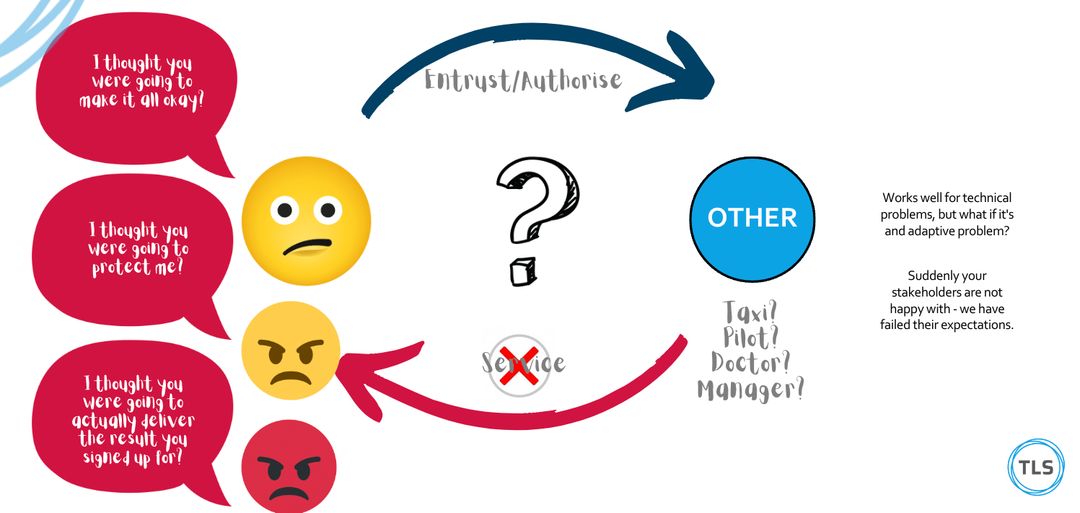
SLIDES XX: FORMAL AND INFORMAL AUTHORITY
Take a closer look at the difference between authority and adaptive leadership. In your organisational life, your authorisers (those who grant you authority) include bosses, peers, your team and even people outside your organisation, such as clients.
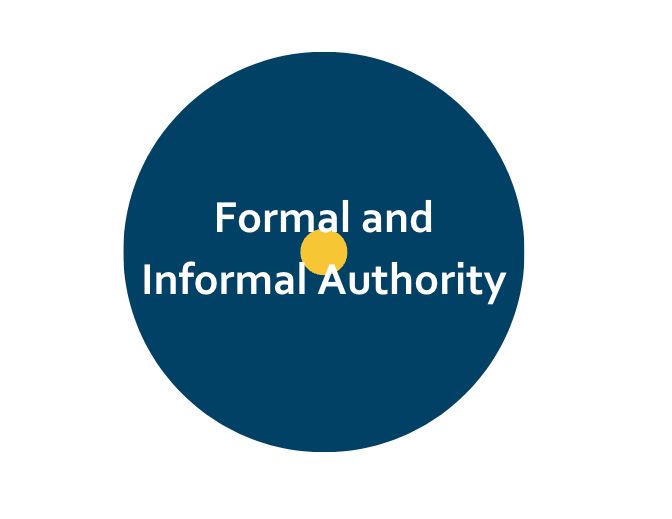
An authoriser is anyone who gives you attention and support to do your job of providing solutions to problems. In any of your roles, whether parent or CEO or doctor or consultant, you have a specific scope of authority that derives from your authorisers’ expectations and that defines the limits of what you are expected to do.
As long as you do what is expected of you, your authorisers are happy. If you do what you are supposed to do really well, you will be rewarded in the coin of the realm, whatever it is: a pay raise, a bonus, a bigger job, a plaque, a more impressive title, a better office.
And one of the most seductive ways your organisation rewards you for doing exactly what it wants - to provide operational excellence in executing directions set by others - is to call you a “leader.” Because you, like most people, aspire to have that label, conferring it on you is a brilliant way of keeping you right where the organization wants you, in the middle of your scope of authority and far away from taking on adaptive leadership work.
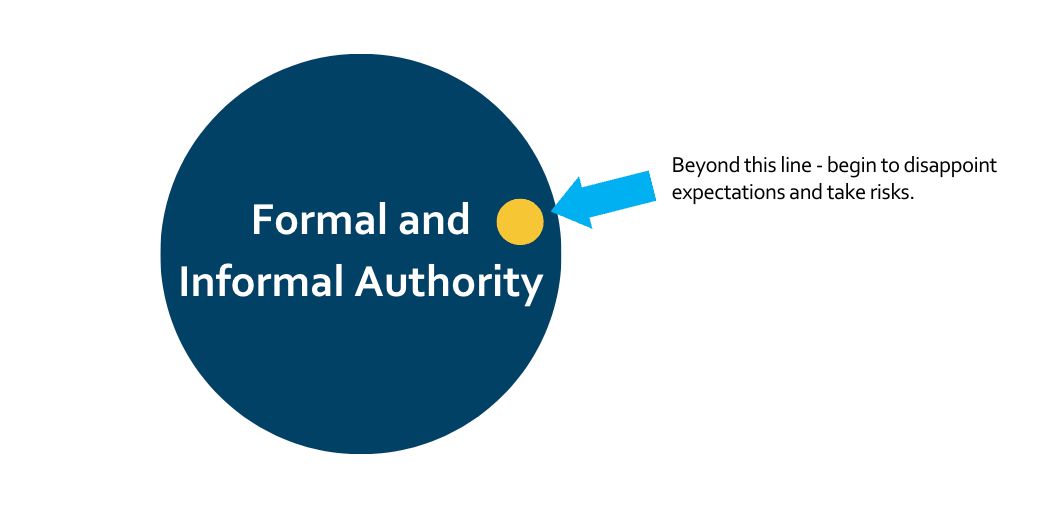
When your organisation calls you a leader, it is rewarding you for doing what your authorisers want you to do. Of course, meeting authorisers’ expectations is important.
In medicine, doctors and nurses save lives every day fulfilling the hopes of patients who entrust them to provide trustworthy service. But doing an excellent job usually has nothing to do with helping your organisation deal with adaptive challenges. To do that, you have to possess the will and skill to dance on the edges of that circle shown (on the slide), on behalf of a purpose you care deeply about.
Adaptive leadership is not about meeting or exceeding your authorizers’ expectations; it is about challenging some of those expectations, finding a way to disappoint people without pushing them completely over the edge. And it requires managing the resistance you will inevitably trigger.
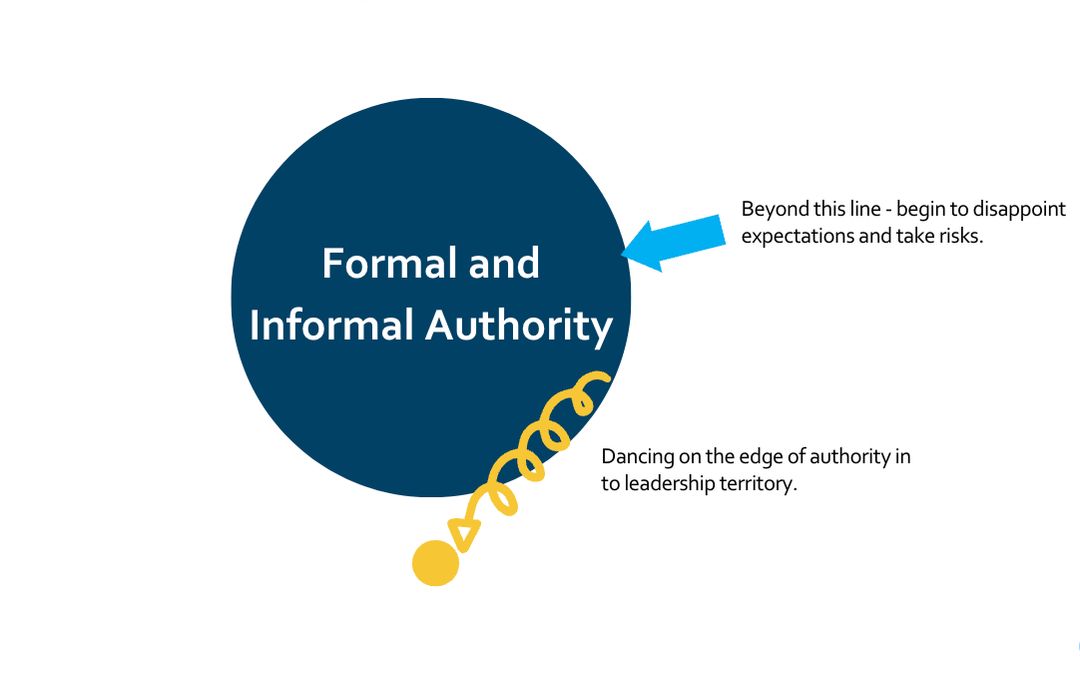
When you exercise adaptive leadership, your authorisers will push back, understandably. They hired you, or voted for you, or authorised you to do one thing, and now you are doing something else: you are challenging the status quo, raising a taboo issue, pointing out contradictions between what people say they value and what they actually value. You are scaring people. They may want to get rid of you and find someone else who will do their bidding.
Imagine a cardiac surgeon, for example, telling patients that he will refuse to do the operation unless the patients do their part of the work: quit smoking and put an exercise regime and a healthy diet into their daily routines after the surgery. Moreover, to ensure compliance, the surgeon insists that patients place 50 percent of all their assets in an escrow account controlled by a third party for six months. It’s likely that most patients will find another surgeon, someone who will do the operation and let them off the hook. And the cardiac surgeon who was eager to mobilise adaptive work among his patients will lose his business.
No wonder there is so little adaptive leadership going on in daily organisational life. Exercising adaptive leadership is dangerous.
The word leader comes from the Indo-European root word leit, the name for the person who carried the flag in front of an army going into battle and usually died in the first enemy attack. His sacrifice would alert the rest of the army to the location of the danger ahead. The dangers reside in the need to challenge the expectations of the very people who give you formal and informal authority.
Discussion.
How does this sit with you?
How much authoritative leadership versus adaptive leadership do you see in your organisation? Yourself?
SLIDE XX: ROLE OF AUTHORITY
Let's look at the role of authority more closely.
From the moment humans are born, they turn to those in authority to provide answers, comfort, sustenance, and safety. Their first concern as newborns is to find the milk supply and then to figure out how to keep it flowing. Babies do whatever is necessary to make that happen: laugh, cry, smile, or whine. As with other mammals, this dependence on authority is hardwired into human DNA. Teenagers develop more complex and nuanced relationships with parents, teachers, coaches, and other authority figures. But even rebellious teenagers and otherwise self-sufficient adults often look again to authorities to provide three things....when problems arise.
Let's look at the role of authority more closely.
SLIDE XX: DIRECTION
What does the silverback gorilla provide?

Direction:
Where to find berries
Where to sleep
Where to travel to/from
SLIDE XX: PROTECTION

SLIDES XX: ORDER
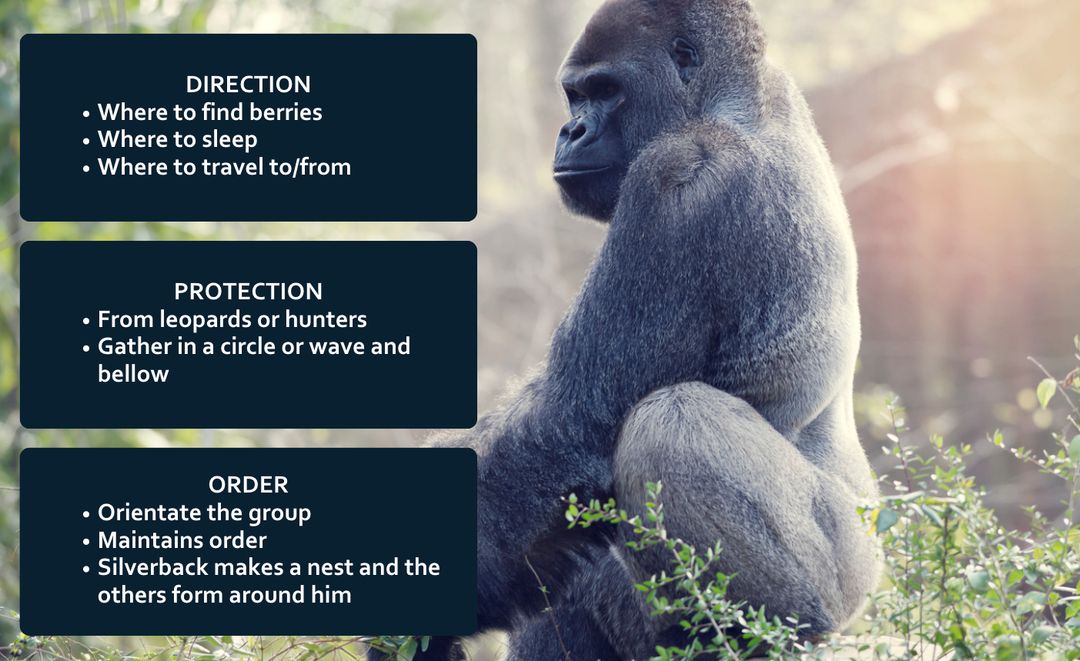
SLIDES SS: LEADERSHIP FROM A POSITION OF AUTHORITY VERSUS ADAPTIVE
Conflating leadership and authority is an old and understandable habit. We all want to believe that we can exercise leadership just by doing really, really well at the job we are expected to carry out.
But the distinction between exercising leadership and exercising authority is crucial. By practicing adaptive leadership beyond authoritative management, you risk telling people what they need to hear rather than what they want to hear, but you can also help your organisation, community, or society make progress on its most difficult challenges.
Whether you are a CEO, a hospital administrator or the head of an advocacy organisation, or simply (simply?) a parent, your functions in your authority role are largely the same.
You have three core responsibilities, to provide: (1) direction, (2) protection, and (3) order. That is, you are expected to clarify roles and offer a vision (direction), make sure that the group, organization, or society is not vulnerable and can survive external threat (protection), and maintain stability (order).
Because addressing adaptive challenges requires stepping into unknown space and disturbing the equilibrium, it is an activity that is inherently uncertain, risky for the organization as well as for the individual, and, for these reasons, often disruptive and disorienting.
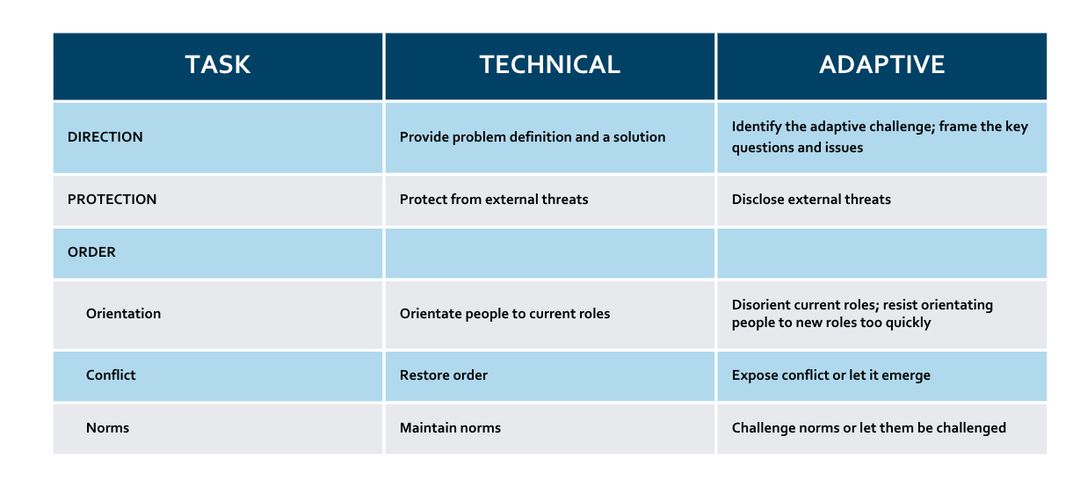
Sometimes wonder have I provided enough DPO or are people just avoiding the work?
Attachments
- Screenshot 2024-06-28 at 2.46.05 pm.png
- Screenshot 2024-06-28 at 2.44.42 pm.png
- Screenshot 2024-06-28 at 2.44.06 pm.png
- Screenshot 2024-06-28 at 2.43.10 pm.png
- Screenshot 2024-06-28 at 2.35.12 pm.png
- Screenshot 2024-06-28 at 2.41.23 pm.png
- Screenshot 2024-06-28 at 2.40.30 pm.png
- Screenshot 2024-06-28 at 2.32.18 pm.png
- Screenshot 2024-06-28 at 2.29.34 pm.png
- Screenshot 2024-06-28 at 2.27.06 pm.png